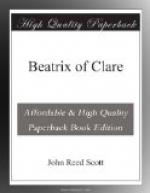“Strike true, fellow,” he said, and calmly placed his head upon the timber’s end.
XII
THE KING’S WORD
From this moment Gloucester moved with no uncertain nor halting steps toward the object of his ambition. With the death of Hastings was removed the only man in England who might have blocked his purpose through either power or ability; and he and Buckingham were left free to play out to its end the wonderful game that won a kingdom without a single disturbance or the drawing of a sword. The moves followed one another in bewildering rapidity, yet with such consummate skill, that when in the great chamber of Baynard’s Castle the final offer of the Crown was made, and the Lord Protector with seeming diffidence accepted it on Stafford’s urging, it appeared but a natural consequence of spontaneous events, brought about only by the force of circumstances and through no deliberate human agency.
In some of these events Sir Aymer de Lacy was an actor, while in others he was but a spectator or bore no part at all. From the grim death-scene in the Tower he had gone back to Crosby Hall and a long talk with Sir John de Bury, wherein he learned what had brought the old Knight so hastily to London and the Lord Chamberlain to the block; and which, ere nightfall, was to send Sir Ralph de Wilton galloping back to Pontefract, bearing an order constituting the Earl of Northumberland Lord High Steward, and directing the trial of Rivers, Grey and Vaughan for the same crime that had proven Hastings’ doom: conspiracy against the Lord Protector. He had chanced to ride by St. Paul’s Cross while Dr. Shaw was in the midst of his sermon on “Bastard slips shall not take deep root.” He had gone with Buckingham to the Guild Hall two days later; had listened with strong approval to the speech wherein Stafford boldly advocated the setting aside of the young Edward in favor of his uncle; and had lent his own voice to the cry: “King Richard! King Richard!” He had witnessed the tender at Baynard’s Castle and the halting acceptance by the Duke—had heard the heralds proclaim the new King in the streets of London—and had seen him ascend the marble seat at Westminster and begin the reign that promised so bright a future. He had ridden in the cavalcade that accompanied the King from the Tower on the Saturday preceding the formal coronation, and had formed one of the throng that participated in the gorgeous ceremony of that July Sunday, when all the power of England’s nobility passed from the Palace to the Abbey to honor him who was to be the last of his Line.




